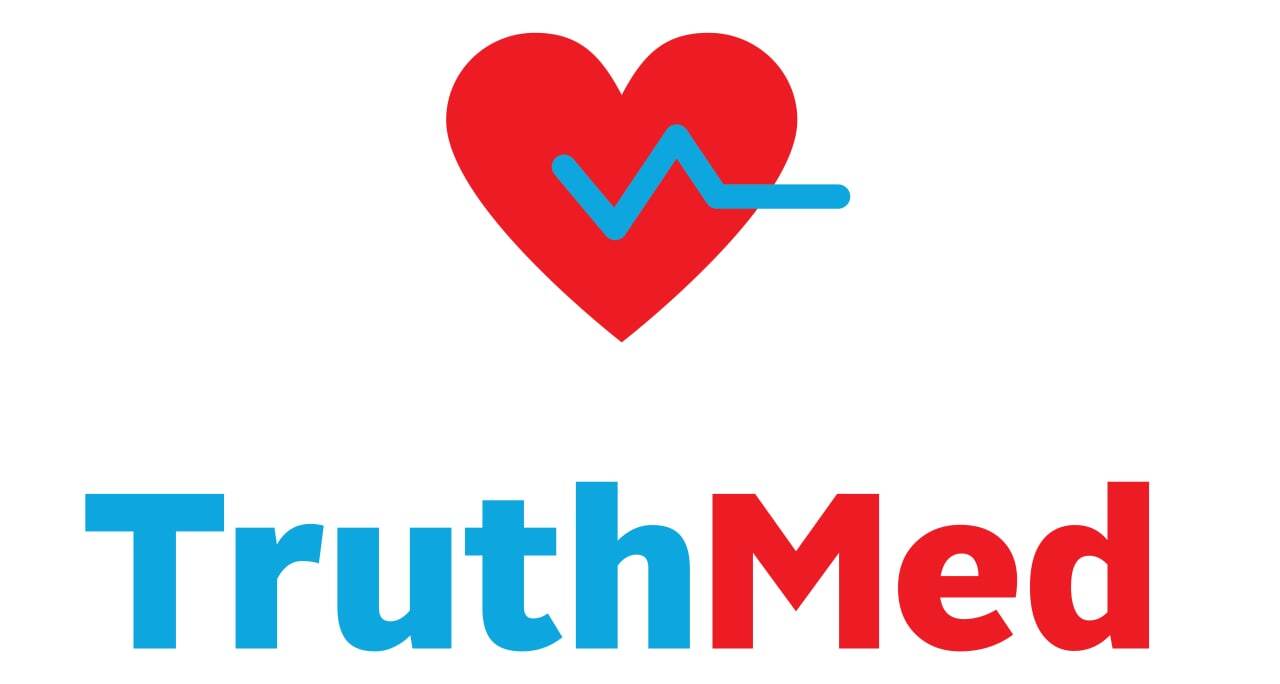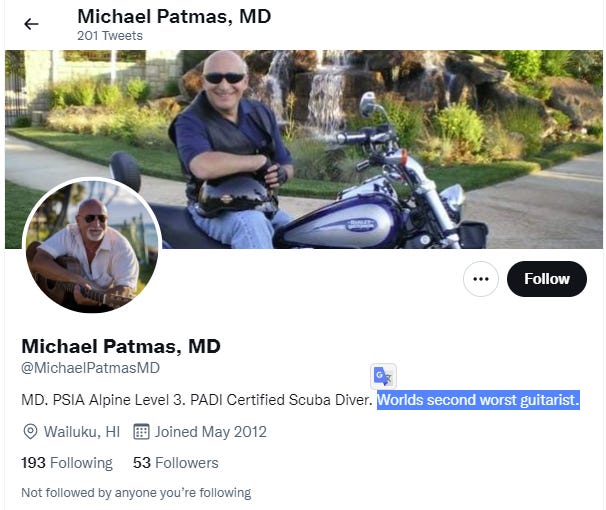Michael Patmas, MD Says That Only People With Credentials Are Qualified to Opine on Infectious Disease Issues
By Steve Kirsch
Thanks, Michael for explaining that to us. I must say that the arrogance of the medical community is truly astonishing. You gotta read this.
Michael Patmas, MD basically says I’m too uneducated to possibly understand anything about vaccines and/or infectious disease. He believes I’m not bright enough to have an intelligent conversation with people like him because I’m not a board certified infectious disease doctor. Basically, I am unable to say anything intelligent that might be relevant and I am incapable of understanding anything he says.
Read this for yourself. It’s priceless. Finally, a doctor willing to verbalize what (presumably) they’ve all been thinking:
For the record, I only have a couple of engineering degrees from MIT and have founded a couple of billion dollar companies so what the heck do I know?
The arrogance here is truly astonishing.
Patmas is highly respected in the community.
“What?!?,” you ask! Well here’s the proof: he has 53 Twitter followers!
OK, I know what you are thinking. You’re wondering, “How did he get so many?”
The answer is that he joined Twitter nearly 10 years ago. That’s how he did it.
He is one of the worst guitarists on planet earth according to his own admission, but I don’t hold that against him at all. I kid you not… it’s right on his Twitter profile:
Note also that Patmas has 53 followers on Twitter.
I currently have >200K followers on social media (I had a lot more before Twitter, LinkedIn, and Medium all banned me for life for spreading “misinformation”).
What’s interesting is that even though Patmas thinks I have the mental capacity that is too small to be measurable in the area of infectious diseases, I was smart enough to realize that fluvoxamine worked against COVID more than a year before any member of the IDSA realized it. It was more than a year after I first said the drug worked (back in November 2020 when Seftel’s trial confirmed it) that the Phase 3 trial proved it to the entire world. Here’s what that definitive Phase 3 trial said:
There was one death in the fluvoxamine group and 12 in the placebo group for the per-protocol population (OR 0·09; 95% CI 0·01–0·47). We found no significant differences in the number of treatment emergent adverse events among patients in the fluvoxamine and placebo groups.
In plain English, if you took the drug EARLY, you were 12X less likely to die. And there were no adverse events indicating a safety problem.
I knew fluvoxamine was safe and effective more than a year ago because I understand math and statistics, something they teach you at MIT. I even reached out to independent statistics experts just to make sure I didn’t miss anything.
And to be extra careful, I even offered a million dollars to anyone who could identify a confounder or bias that could explain the results. Nobody could show that. All the experts offered was “well there MIGHT be a confounder or bias that explains the results even though we can’t think of one.” Sure, there might be.
But what about the Precautionary Principle of Medicine? Apparently, nobody likes to use that. It basically translates (in this case) to the following: “if you have an intervention that has no downsides and where the math shows it is pretty much impossible that the drug doesn’t have a significant positive effect (in this case there was less than 1 chance in 1e14 that the results happened by luck), you should use the drug since that would maximize the number of lives saved.”
The rationale is easy to understand here. If you were wrong, no lives would be lost since the drug has a safety record going back 40 years. If you were right, you’d save a ton of lives. It’s an obvious principle. There is simply no downside if you are wrong and a huge upside if you are right. And the math showed a virtual certainty of being right (multiple independent trials with low p-values and very large effect sizes). However, this is a principle the IDSA members simply refuse to use. They basically have a “do whatever the NIH says” approach to treating disease. This is how medicine works nowadays. You don’t want to say anything that could jeopardize anyone’s NIH grants.
In summary, more than a year before the Phase 3 trial result was published, the math is clear: this is a safe drug that is extremely effective if given early, even at dosages as low as 50mg twice a day for 14 days. In Seftel’s study, none of the 77 patients who got the drug early developed any long-haul COVID symptoms. That is impossible if the drug didn’t work. There was a 25% rate of long-haul COVID in the group that refused the drug. Do the math. That’s statistically impossible if the drug was a dud.
Of course, the IDSA did absolutely nothing about fluvoxamine. They sat on their butts and ignored the drug and let people die unnecessarily even though it is impossible to explain the two independent study results (Lenze and Seftel) if the drug didn’t work.
The IDSA considers fluvoxamine too speculative to use and says it should only be used in the context of a clinical trial. Wow. 12X mortality reduction in a pandemic and we should do even more clinical trials? They basically don’t care about human life at all. All they care about is not making a mistake. There is no risk-benefit calculation here. They put a zero value on human life. They are only concerned about their reputation. They don’t want to be “wrong.”
Even worse is that IDSA member Judith Feinberg trashed me in an article in Tech Review:
“He may not be a good scientist, but he’s smart,” says WVU’s Feinberg. “He’s very convincing. He might be a good snake oil salesman.”
Are you kidding me? A snake oil salesman?!?!
I’m an engineer. I look at the COVID problem as “how do we minimize lives lost?” Answer: deploy fluvoxamine since there is well over a 99% chance it works and less than 1% chance it does nothing.
Doctors look at the problem and ask, “How do we minimize the chance of being wrong?” Or “how do we minimize the risk that the NIH will be upset at us?”
The data from the Phase 3 trial shows I was absolutely right about the drug. Feinberg was wrong. A 12X mortality benefit is huge. It’s better than the “vaccine.” In the Pfizer 6 month data, it only showed 2X mortality benefit (under the assumption that none of the all-cause deaths were due to the vaccine). So what she does is call me a “snake oil salesman.” Wow. These are the kind of people who are members of the IDSA. They basically let people die while they insist on trials, trials, and more trials. Even today, the IDSA can’t figure out whether fluvoxamine works or not.
This is not just my opinion that fluvoxamine works. Experts agree with me.
Fluvoxamine was incorporated in the extraordinarily effective Fareed-Tyson protocol (approximately 10,000 treated patients without a death). Fluvoxamine was incorporated in the FLCCC protocol. Independent doctors who have tried it swear by it.
More significantly, the majority of an expert panel (from the CDC, FDA, and academia) agreed that the evidence justified a collaborative decision making process with patients.
Lastly, a group of doctors applied for an EUA with the FDA. They wouldn’t have done that if they didn’t think the drug worked. So even the “traditional” medical experts agreed I was right.
Let’s be clear. These infectious disease “experts” won’t do a debate because they would be too embarrassed that someone with no formal medical training figured out that early treatments with repurposed drugs works and the COVID vaccines are unsafe and ineffective. This is opposite to the IDSA belief system.
That is the real reason they won’t debate me: because the evidence discredits them. They will be unable to explain why keeping doctors from using fluvoxamine is going to save lives.
Here is Patmas’ argument as a graphic
Are they too busy treating unvaccinated COVID patients like Dr. Patmas says?
Well, if the doctors told people to use an early treatment protocol like Fareed-Tyson, the hospitals would be empty of COVID patients.
Here’s a story that came out just three days ago showing hospital COVID cases are at a record low so I’m confused about what Dr. Patmas is talking about.



